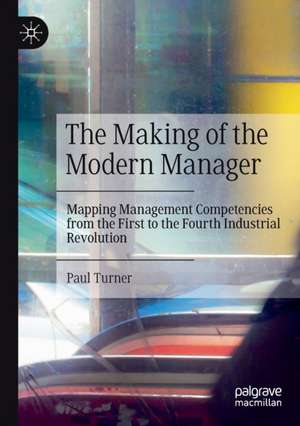The Making of the Modern Manager: Mapping Management Competencies from the First to the Fourth Industrial Revolution
Autor Paul Turneren Limba Engleză Paperback – 15 sep 2022
Presenting a wide, deep and engaged body of research about management, this book explores how management competencies have developed over time and whether these are still relevant to the management of contemporary organizations. The author addresses this question by tracing the evolution of management competencies from the First to the Fourth Industrial revolution, investigating the role and style of managers in each ‘revolution’ and in multiple geographies. Ultimately, this book suggests that that five ‘core management competencies; will be relevant as the Fourth Industrial Revolution gathers momentum.
| Toate formatele și edițiile | Preț | Express |
|---|---|---|
| Paperback (1) | 1004.00 lei 6-8 săpt. | |
| Springer International Publishing – 15 sep 2022 | 1004.00 lei 6-8 săpt. | |
| Hardback (1) | 1008.40 lei 6-8 săpt. | |
| Springer International Publishing – 14 sep 2021 | 1008.40 lei 6-8 săpt. |
Preț: 1004.00 lei
Preț vechi: 1224.39 lei
-18% Nou
Puncte Express: 1506
Preț estimativ în valută:
192.11€ • 201.12$ • 158.96£
192.11€ • 201.12$ • 158.96£
Carte tipărită la comandă
Livrare economică 05-19 aprilie
Preluare comenzi: 021 569.72.76
Specificații
ISBN-13: 9783030810641
ISBN-10: 303081064X
Pagini: 407
Ilustrații: XXIII, 407 p. 8 illus.
Dimensiuni: 148 x 210 mm
Greutate: 0.56 kg
Ediția:1st ed. 2021
Editura: Springer International Publishing
Colecția Palgrave Macmillan
Locul publicării:Cham, Switzerland
ISBN-10: 303081064X
Pagini: 407
Ilustrații: XXIII, 407 p. 8 illus.
Dimensiuni: 148 x 210 mm
Greutate: 0.56 kg
Ediția:1st ed. 2021
Editura: Springer International Publishing
Colecția Palgrave Macmillan
Locul publicării:Cham, Switzerland
Cuprins
Chapter 1- What is management; what do managers do?
Chapter 2- Management during the First Industrial Revolution
Chapter 3- Management during the Second Industrial Revolution
Chapter 4 – Management During the Third Industrial Revolution
Chapter 5- The Fourth Industrial Revolution
Chapter 6- Core Management Competences
Chapter 7- Management Competence for the Fourth Industrial Revolution – Demonstrates agile governance and adaptability to make change work effectively
Chapter 8- Management Competence for the Fourth Industrial Revolution- Collaborates to create and share knowledge and information
Chapter 9- Management Competence for the Fourth Industrial Revolution- Engages and Develops the Workforce
Chapter 10- Management Competence for the Fourth Industrial Revolution - integrates multiple systems and processes and seeks continuous improvement
Chapter 11- Management Competence for the Fourth Industrial Revolution – takes effective action to deliver results
Chapter 12- The Making of the Modern Manager- Core management competences and their attributes
Chapter 2- Management during the First Industrial Revolution
Chapter 3- Management during the Second Industrial Revolution
Chapter 4 – Management During the Third Industrial Revolution
Chapter 5- The Fourth Industrial Revolution
Chapter 6- Core Management Competences
Chapter 7- Management Competence for the Fourth Industrial Revolution – Demonstrates agile governance and adaptability to make change work effectively
Chapter 8- Management Competence for the Fourth Industrial Revolution- Collaborates to create and share knowledge and information
Chapter 9- Management Competence for the Fourth Industrial Revolution- Engages and Develops the Workforce
Chapter 10- Management Competence for the Fourth Industrial Revolution - integrates multiple systems and processes and seeks continuous improvement
Chapter 11- Management Competence for the Fourth Industrial Revolution – takes effective action to deliver results
Chapter 12- The Making of the Modern Manager- Core management competences and their attributes
Notă biografică
Paul Turner has held Professorial appointments at Universities in Leeds, Birmingham, Nottingham and Cambridge. His business career included Executive and Director positions in FTSE and Fortune companies, and he was Vice President of the CIPD. Paul is the author or co- author of Employee Engagement, Leadership in Healthcare, Talent Management in Healthcare, Make Your People Before You Make Your Products, Workforce Planning, The Admirable Company, Talent Strategy, Management and Measurement, Organisational Communication and HR Forecasting and Planning.
Textul de pe ultima copertă
Management is a constellation of concepts and ideas. Its many definitions span the boundaries of leadership and strategy on the one hand and business administration on the other; from people management to P&L accounts, to both change and stability, sometimes simultaneously. There are few concepts that have attracted as much business interest as the management of organisations.
Presenting a wide, deep and engaged body of research about management, this book explores how management competencies have developed over time and whether these are still relevant to the management of contemporary organizations. The author addresses this question by tracing the evolution of management competencies from the First to the Fourth Industrial revolution, investigating the role and style of managers in each ‘revolution’ and in multiple geographies. Ultimately, this book suggests that that five ‘core management competencies; will be relevant as the Fourth Industrial Revolution gathers momentum.
Paul Turner has held Professorial appointments at Universities in Leeds, Birmingham, Nottingham and Cambridge. His business career included Executive and Director positions in FTSE and Fortune companies, and he was Vice President of the CIPD. Paul is the author or co- author of Employee Engagement, Leadership in Healthcare, Talent Management in Healthcare, Make Your People Before You Make Your Products, Workforce Planning, The Admirable Company, Talent Strategy, Management and Measurement, Organisational Communication and HR Forecasting and Planning.
Caracteristici
Presents the characteristics of management and competence from First Industrial Revolution in the 1750s to present day
Evaluates how and why the various definitions of management emerged and investigates their historical antecedents
Uses practical evidence from managers to support theoretical assumptions
Evaluates how and why the various definitions of management emerged and investigates their historical antecedents
Uses practical evidence from managers to support theoretical assumptions
